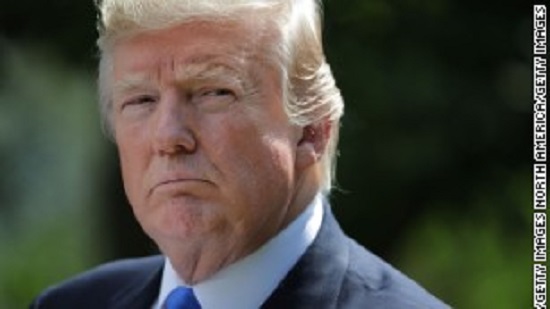Donald Trump, as a presidential candidate, never promised compromise. He instead promised the opposite: reform through sheer force of will. "Nobody knows the system better than me," said Trump when accepting the Republican nomination, "which is why I alone can fix it." The trouble with such a self-centered approach? It is contrary to the Constitution.
The Constitution has stopped Trump -- so far
By-Lisa Marshall Manheim-CNN
Opinion
00:02
Tuesday ,06 February 2018

Indeed, it is our nation s powerful legal framework that explains so much of what President Trump has accomplished, and failed to accomplish, during his first year in office. This framework sustains a system of government that resists unilateral action and rejects singular efforts to consolidate power.
But past performance is no guarantee of future results. And as President Trump s second year begins on Saturday, it remains to be seen whether these constitutional constraints will survive.
For now, the rule of law is still standing, and this durability bodes well for its future. But the rule of law cannot be taken for granted. Indeed, it is under attack -- by the same man it is constraining.
To understand the significance of legal constraints, take, for example, Trump s promise to build a "big, beautiful" wall separating the United States from Mexico. A year in, construction sites remain empty. This is because the Constitution allows the federal government to spend money -- including the billions it would take to build a border wall -- only if Congress authorizes that spending. Thus far, Congress has refused to deliver.
Trump also pledged to crack down on so-called "sanctuary cities." This crackdown has not occurred. Instead, the administration has been forced to rely on indirect means of pressuring these jurisdictions, including by increasing patrols in affected areas. The Constitution again explains: it protects the ability of state and local governments to refuse to join federal deportation efforts, and it bars the President from conscripting their services.
Trump's 'trial balloons' test our commitment to freedom
Trump s trial balloons test our commitment to freedom
A similar pattern unfolds across a range of issues. "A total and complete shutdown of Muslims entering the United States." "Open(ing) up our libel laws." Punishing people through "loss of citizenship." All these pledges, among so many others, run headfirst into constitutional constraints.
Still, Trump did manage to fulfill some of his key campaign promises. The rule of law also helps to explain these successes.
Most prominently, in December 2017, Trump signed into law a transformation of the US tax code. Trump could not have achieved this reform himself. The Constitution instead required that he work with hundreds of members of Congress to turn the bill into law, and he did. A similar legal dynamic explains another important reform: the legislative repeal of over a dozen Obama-era regulations.
Trump has also managed to meaningfully advance his political agenda through the courts and federal agencies. This is because the Constitution allows the President -- with the Senate s approval -- to nominate people to high-ranking positions in government.
For example, Trump nominated Scott Pruitt, a person resistant to environmental regulation, to head the Environmental Protection Agency. Trump anticipated (correctly) that this appointee would work to dismantle Obama-era protections, such as the Clean Power Plan, from the inside.
Trump likewise has nominated dozens of conservative lawyers for positions on the federal bench, where each appointee will have the opportunity to affect for the rest of their lives how the nation s laws are interpreted and applied.
26 voices on why the free press matters
26 voices on why the free press matters
President Trump has been able to deliver all this, and more, because the law allows him to. He has failed to fulfill other commitments because the law has posed insurmountable barriers.
Still, President Trump s actions continue to threaten the rule of law. Some of these attacks are brazen. Trump s response to judicial rulings, for example, has been to question the courts legitimacy and even attack the judges personally.
Other attacks are somewhat subtler, but also undermine confidence in our legal structures. Trump pardoned ex-sheriff Joe Arpaio, setting free a man who had refused to obey court orders protecting the rights of immigrants. He has called for his political opponents to be criminally investigated. He and his administration have repeatedly derided the First Amendment s protections of speech and the press.
There is more. Much more. But the ultimate point is the same: this steady assault on the rule of law threatens to radically increase the power wielded by politicians like President Trump -- politicians dismissive of limits and disdainful of norms. Without the rule of law, our Constitution s system of checks and balances cannot function, and a president s power becomes, in important respects, unconstrained.
Fortunately, that was not the story of 2017. But what about 2018? And beyond?
Follow CNN Opinion
Join us on Twitter and Facebook
On one level, the power to protect the rule of law is where it always has been: in all of our hands. By voting, by engaging with elected officials, and by exercising the right to speak out, each of us can advance our own individual beliefs and agendas by lawful means. In so doing, we reinforce the importance of legal constraints.
This work is hard. But for the United States to remain, as its founders intended, a "government of laws, and not of men," that work is indispensable.


